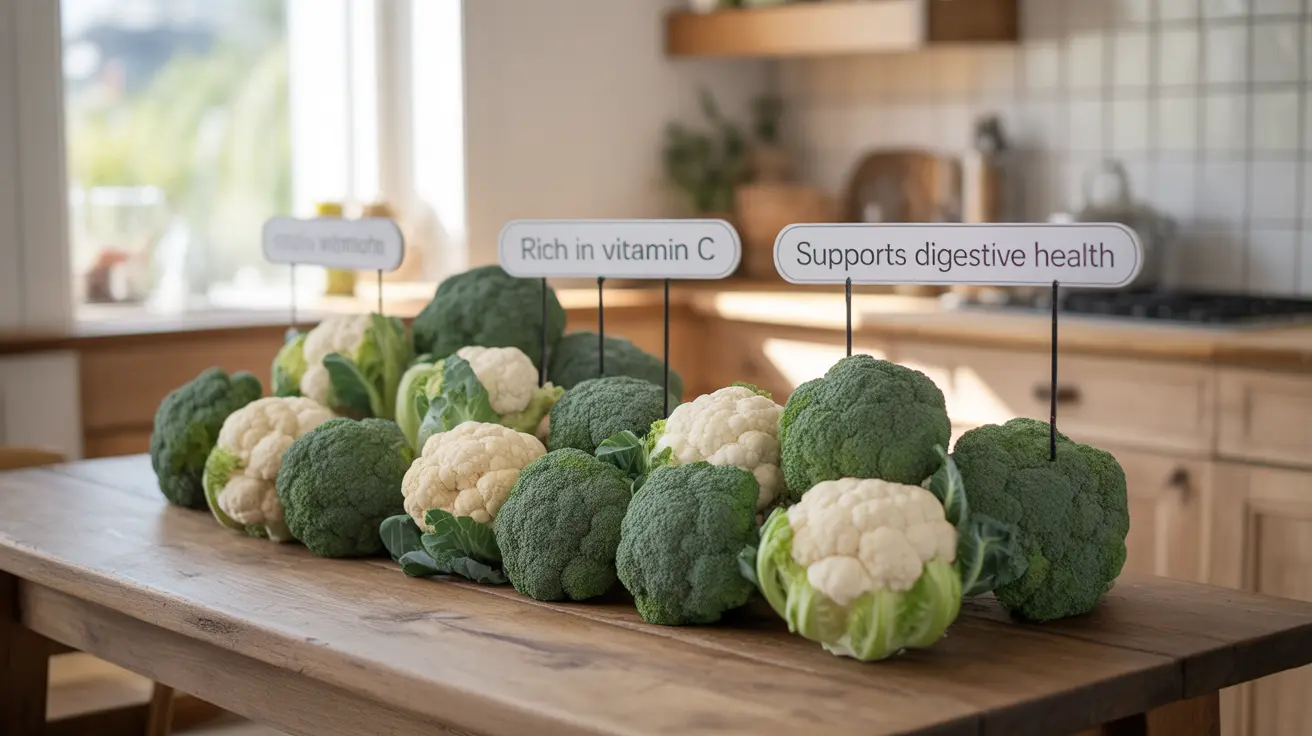When it comes to healthy eating, cruciferous vegetables like broccoli and cauliflower are nutrition powerhouses that deserve a spot on your plate. Both vegetables offer unique health benefits and essential nutrients, but they differ in significant ways. Understanding these differences can help you make informed choices about incorporating them into your diet.
Let's explore the distinct nutritional profiles, health benefits, and practical uses of these versatile vegetables to help you maximize their potential in your meals.
Nutritional Profile Comparison
While both vegetables are low in calories and high in fiber, their nutrient content varies considerably. Broccoli generally contains more vitamins and minerals per serving, particularly:
- Vitamin C: Broccoli provides 85% of daily needs vs. cauliflower's 77%
- Vitamin K: Significantly higher in broccoli
- Vitamin A: Broccoli contains more beta-carotene
- Folate: Both provide good amounts, with broccoli slightly higher
Cauliflower, while lower in some nutrients, offers its own benefits:
- Lower carbohydrate content
- Excellent source of vitamin B6
- Rich in antioxidants
- Versatile substitute for high-carb foods
Health Benefits and Disease Prevention
Cancer-Fighting Properties
Both vegetables contain powerful compounds that may help prevent various types of cancer. Broccoli is particularly rich in sulforaphane, while cauliflower contains unique indole-3-carbinol. These compounds have been shown to inhibit cancer cell growth and promote cellular health.
Heart Health Support
The fiber, potassium, and anti-inflammatory compounds in both vegetables contribute to cardiovascular health. They help reduce blood pressure, decrease inflammation, and support healthy cholesterol levels.
Weight Management and Digestive Health
Both vegetables excel in supporting weight management goals:
- Low in calories (25-30 calories per cup)
- High in fiber for satiety
- Versatile cooking options
- Rich in prebiotics for gut health
Cauliflower's Special Role
Cauliflower has gained popularity as a low-carb substitute for:
- Rice
- Pizza crust
- Mashed potatoes
- Wing alternatives
Eye Health and Vision Support
While both vegetables support eye health, broccoli takes the lead with its higher content of lutein and zeaxanthin, two crucial compounds for maintaining healthy vision and preventing age-related eye conditions.
Frequently Asked Questions
What are the main nutritional differences between broccoli and cauliflower?
Broccoli contains higher levels of vitamins C, K, and A, while cauliflower has fewer calories and carbohydrates. Broccoli provides more protein and fiber per serving, but both vegetables are excellent sources of essential nutrients.
How do broccoli and cauliflower support heart health and cancer prevention?
Both vegetables contain glucosinolates and antioxidants that help fight inflammation and potentially prevent cancer cell growth. They also provide fiber and potassium, which support healthy blood pressure and cholesterol levels.
Which vegetable has more vitamins and antioxidants, broccoli or cauliflower?
Broccoli generally contains higher levels of vitamins and antioxidants, particularly vitamin C, vitamin K, and beta-carotene. However, cauliflower still provides significant amounts of these nutrients and has its own unique antioxidant profile.
Can eating broccoli or cauliflower help improve eye health?
Yes, particularly broccoli, which is rich in lutein and zeaxanthin - compounds that protect against age-related eye conditions. Cauliflower also supports eye health but contains lower amounts of these specific nutrients.
Are broccoli and cauliflower good choices for weight loss and digestion?
Both vegetables are excellent choices for weight loss and digestive health. They're low in calories, high in fiber, and contain compounds that support healthy gut bacteria. Cauliflower is particularly popular in low-carb diets as a versatile substitute for higher-calorie foods.




